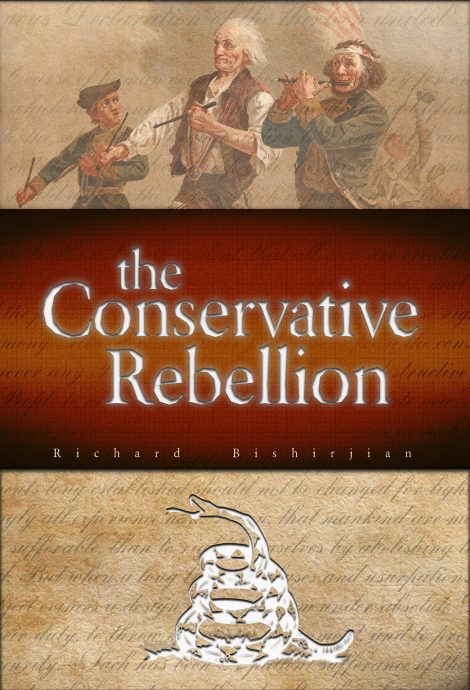What the state-oriented economists and the market-oriented economists might both be underestimating: ideas, attitudes, moral codes, and mental disciplines.
Attuned to the Daimon
Richard Bishirjian wears many hats. He’s a businessman, speaker, educator, regular contributor to Modern Age, founder and president of Yorktown University, and champion of online education. He has been a visible presence at conservative conferences and colloquia and an active member of the Intercollegiate Studies Institute, the Philadelphia Society, and the National Association of Scholars. As a young man he studied under Gerhart Niemeyer, Ralph McInerny, Eric Voegelin, and Michael Oakeshott, whose philosophical influences are on display in The Conservative Rebellion, Bishirjian’s latest book, which seeks to reclaim that evocative and oft-abused signifier, “rebel.”
The author disavows the term “conservative movement” even as he uses it out of convenience. Movements as he describes them are “anti-traditional and ideologically motivated revolutionary currents” such as communism or National Socialism that have nothing to do with conservatism, which, he maintains, is constitutionally anti-ideological and anti-utopian. The conservative rebellion, then, is not a movement but a state of mind shared by enough individuals to comprise a community of purpose.
Bishirjian assures us that “this is a work of political theory by which its author affirms a reality that ‘is’ at the same time that he and his fellow Conservative Rebels are its representatives.” He thus locates himself and others like him—the conservative rebels—in a moment of American history that he calls the period of recovery.
This recovery follows four paradigmatic, transitional stages of the American body politic: 1) the revolutionary “spirit” that galvanized the Declaration of Independence; 2) the circumspect limited-government ethos that found expression in the U.S. Constitution; 3) the quasi-religious new nationalism of Abraham Lincoln, which was spiritual and democratic in substance; and 4) the civic religion of modern millennialism in which Progressive idealism, characterized by Woodrow Wilson’s crusading reforms, actualized Lincoln’s mystical vision by replacing limited government with nationalized and centralized power.
Just as each paradigm supplanted its predecessor, so the conservative rebellion of today—a fifth paradigmatic stage—is working to undermine the normative principles bequeathed to us by Lincoln and magnified by Wilson. Bishirjian believes we are struggling with the tensions between the fourth and fifth stages, even within conservative circles, insofar as neoconservatism recalls Lincoln’s and Wilson’s “consciousness of order.” He’s used a Voegelinian term there. It’s the Voegelin in Bishirjian that elicits his overall critique of neoconservatives, whose vision for global democracy and human rights, in his mind, resembles the Gnostic conception of a heaven on earth within history.
The Conservative Rebellion is part memoir, part prescription. It recalls Bishirjian’s formative university years and might be described, in part, as the story of his intellectual awakening. The prose is anything but pedantic, its muscular quality seen, for example, when he writes that “from 1961 to 1964 I read any and every book I could get my hands on to try to figure out what in the hell was going on.” Political incorrectness abounds, as when he describes where he studied:
Take a backwater graduate institution along the St. Joseph River like Notre Dame, have it focus on a backwater region like Latin America, and you seal Notre Dame’s fate as just another graduate program in government.
Bishirjian here refers to the chairman of the Department of Government deciding, in the late 1960s, to reorient the curriculum toward Latin American studies rather than capitalizing on the talent and specialties already existing among a faculty that included Voegelin, Niemeyer, and Stanley Parry. This reconfiguration followed the alleged purging of Notre Dame’s conservative faculty under Father Theodore Hesburgh, its president from 1952 to 1987. The criticisms of the university’s administration during his graduate studies reveal the intensity with which Bishirjian approaches ideas. So does his recalling the fact that he wept the first time he read Voegelin’s The New Science of Politics (1952).
He primarily considers the conservative rebellion he participated in from the time of the Kennedy presidency through that of Jimmy Carter. With the ascendancy of Ronald Reagan and the fall of the Berlin Wall, Bishirjian and his cohorts saw the fruits of their labor and rejoiced, but only for a time. Eventually infighting and enforced ideological standards slowed their momentum and sent well-meaning friends along differing paths. Bishirjian relates that traditional conservatives in the Reagan administration were gradually displaced by neoconservatives after the resignation of Richard V. Allen as National Security Adviser. From that moment on, he suggests, Republican presidential administrations were increasingly peopled by neoconservatives, a word that goes undefined.
The object of Bishirjian’s animus is Progressivism, or Woodrow Wilson’s “political religion.” That he also calls communism a “political religion” suggests how destructively ideological he believes Wilson’s programs and legacy to have been. He submits that political religion is “ersatz religion” in that it’s a “false construction that intervenes between us and the experience of reality,” a bold and curious claim that makes sense only in light of Voegelin’s teachings.
At times, though, the author denominates Progressivism as liberalism. Not to be mistaken for the classical variety, his targeted liberalism is “intolerant, illiberal, devoid of magnanimity and devoted to the expansion of state power.” So defined, liberalism stands in contradistinction to conservatism, which, he says, is a “political theory linked to an attitude of spirit and mind, not a political philosophy by which the greater universe becomes visible.”
The Wilsonian worldview is most obviously manifest in foreign policy. Bishirjian articulates his longstanding discontent with the Vietnam War and believes “it is not a moral obligation of the American people to die so that others may realize their nationhood.” At the same time, he condemns the coordinated ostracizing of faculty who spoke out in favor of that war. He lambasts both Bush presidencies for their grandiose foreign policy and cautions that
Nothing grows more quickly during war than the powers of the state with the result that by the end of the twentieth century the American administrative state had become the enemy of all Americans, but only social, political and economic conservatives seemed concerned.
Although bitter, Bishirjian is something of an optimist. He sees the potential for cultural restoration, hoping our decline will be followed by prophetic renewal. He notes that Plato and Augustine, respectively, arose from the collapse of the Greek city-state and the Roman Empire. Anxiously alive to the intellectual bankruptcy of mainstream conservatism of the prepackaged, mass-market television variety, he laments “the decline in conservative scholarship and influence in academe,” where institutions of knowledge and learning ought to breed contemplative figureheads.
St. Augustine’s Press has put out a handsome hardback edition of this book. (One would have liked to see more careful copy-editing, though. The typographical errors are distracting.) Its normative assessments and presiding themes should provoke readers on the Left and the Right. Its main thrust is that, to recover the lost tradition of conservatism, what is required is the leadership of men and women attentive to the redemptive and visionary powers of the daimon.
The Conservative Rebellion reaches print just three months after the publication of Harold Bloom’s The Daemon Knows, in which the notion of the daimon (Greek), or the daemon (Latin), figures prominently as a sublime, aboriginal force of human imagination. The daimon prophesies a cosmology, not a short-term political platform or “get-out-the-vote” campaign. He consults Boethius, not Karl Rove. He counsels a consciousness of time and order, not a debate strategy or partisan wager. The luminosity of consciousness isn’t a purely pragmatic strategy capable of yielding quick results, but it does fulfill the mundane task of disclosing a way forward. It’s a prudent plan, in other words, not just a numinous agency, and it has the potential to instantiate once again the fusionism of Frank Meyer (about which Don Devine wrote on this site recently).
If Bishirjian is correct, then those attuned to the dynamism of the daimon might be found among “philosophers, knowledgeable political leaders, non-ideological publications, wealthy benefactors and supportive institutions.” It’s telling that he doesn’t name living examples. One wonders if there are any.



